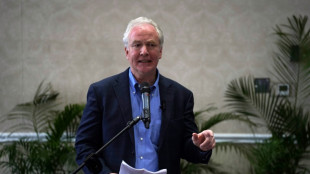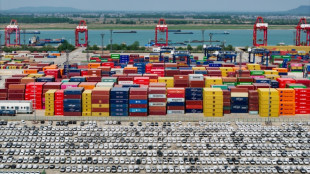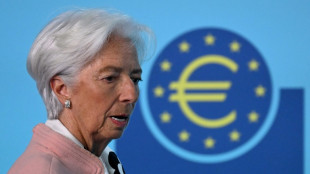
-
 SFWJ / Medcana Announces Strategic Expansion Into Australia With Acquisition of Cannabis Import and Distribution Licenses
SFWJ / Medcana Announces Strategic Expansion Into Australia With Acquisition of Cannabis Import and Distribution Licenses
-
Frankfurt's Goetze sidelined with leg injury

-
 Spurs players 'never lost belief', says Postecoglou
Spurs players 'never lost belief', says Postecoglou
-
Man Utd stun Lyon in nine-goal Europa League classic to reach semis

-
 Netflix earnings in first quarter of 2025 top forecasts
Netflix earnings in first quarter of 2025 top forecasts
-
Trump says US 'talking' to China on tariffs

-
 Salvadoran soldiers stop US senator near prison holding expelled migrant
Salvadoran soldiers stop US senator near prison holding expelled migrant
-
Solanke penalty sends Spurs to Europa League semis

-
 CAF crackdown after trouble in African club matches
CAF crackdown after trouble in African club matches
-
Trump talks up EU tariff deal as Italy's Meloni visits

-
 Trump insists he could fire independent Fed Chair Powell
Trump insists he could fire independent Fed Chair Powell
-
Google has illegal monopoly in ad tech, US judge rules

-
 Trump softens on Zelensky, says mineral deal coming 'soon'
Trump softens on Zelensky, says mineral deal coming 'soon'
-
Jacks helps Mumbai beat Hyderabad in IPL

-
 Countries must 'make the best' of new multipolar world: IMF chief
Countries must 'make the best' of new multipolar world: IMF chief
-
Heavy spring snow storm wreaks havoc in the Alps

-
 US judge rules against Google in online ad tech antitrust case
US judge rules against Google in online ad tech antitrust case
-
Andreeva knocked out by Alexandrova in Stuttgart last 16

-
 Iran challenges four countries in UN court over jet it downed in 2020
Iran challenges four countries in UN court over jet it downed in 2020
-
'Not at 50' - Alonso sets retirement limit

-
 Macron praises US-European-Ukraine talks as 'important occasion for convergence'
Macron praises US-European-Ukraine talks as 'important occasion for convergence'
-
Verstappen dismisses Red Bull exit fears

-
 Italy's Meloni, Trump talk up EU trade deal hopes
Italy's Meloni, Trump talk up EU trade deal hopes
-
'Slow but steady' progress for Martin after Qatar MotoGP crash

-
 Pogacar-Van der Poel duel inspires Evenepoel comeback
Pogacar-Van der Poel duel inspires Evenepoel comeback
-
US judge rules Google monopolized online ad tech market

-
 Bearman back at 'special' debut-track Jeddah
Bearman back at 'special' debut-track Jeddah
-
Swiss watch exports to US soared ahead of Trump tariffs

-
 Alcaraz finds best to reach Barcelona Open quarters
Alcaraz finds best to reach Barcelona Open quarters
-
Where are all the aliens?: Fermi's Paradox explained

-
 France full-back Dulin to retire at end of season
France full-back Dulin to retire at end of season
-
World economy likely to avoid recession despite tariffs: IMF chief

-
 57 killed in Sudan's Darfur as trapped civilians fear bloodbath
57 killed in Sudan's Darfur as trapped civilians fear bloodbath
-
Vietnam ups wind, solar targets as energy demand soars

-
 Pope says doing 'best he can' on jail visit before Easter
Pope says doing 'best he can' on jail visit before Easter
-
China's Xi meets Cambodian leader as part of regional diplomatic blitz

-
 Ukrainian tennis player seeks legal justice over 'moral abuse'
Ukrainian tennis player seeks legal justice over 'moral abuse'
-
Italy's Meloni seeks EU tariff deal from Trump

-
 France's feminist icon Pelicot to sue Paris Match for privacy invasion
France's feminist icon Pelicot to sue Paris Match for privacy invasion
-
World economy should avoid recession despite tariffs, IMF chief says

-
 Stocks waver as ECB cuts rate, Trump slams Fed chief
Stocks waver as ECB cuts rate, Trump slams Fed chief
-
France, UK mull migrant swaps in bid to stem Channel crossings

-
 Nuno says Forest still in control of Champions League chase
Nuno says Forest still in control of Champions League chase
-
Malinin, Liu help US take early lead at skating's World Team Trophy

-
 Clashes in Sudan's besieged Darfur city kill 57
Clashes in Sudan's besieged Darfur city kill 57
-
Kyiv's Europe allies seek influence with US in Paris talks

-
 Russia scraps Taliban's 'terror' label amid warming ties
Russia scraps Taliban's 'terror' label amid warming ties
-
Trump says Fed chief's 'termination cannot come fast enough'

-
 China's Xi, seeking to build regional ties, meets Cambodian leader
China's Xi, seeking to build regional ties, meets Cambodian leader
-
ECB cuts rates as Trump tariffs raise fears for eurozone growth


What we know about how 'forever chemicals' affect health
Invisible, omnipresent "forever chemicals" have been linked to a wide range of serious effects on human health, prompting growing calls for them to be banned.
While there is firm evidence that at least one of the more than 4,000 human-made chemicals called PFAS causes cancer, researchers are still attempting to fully understand their broader impact on health.
Here is what we know so far.
- What are PFAS? -
Per- and polyfluoroalkyl substances (PFAS) are synthetic chemicals that were first developed in the 1940s to withstand intense heat and repel water and grease.
They have since been used in a vast range of household and industrial products including food packaging, make-up, stain-proof fabric, non-stick pots and pans and foam used to fight fires.
Because PFAS take an extremely long time to break down -- earning them the nickname "forever chemicals" -- over the years they have seeped into the soil and groundwater, getting into our food chain and drinking water in the process.
These chemicals have now been detected virtually everywhere on Earth, from the top of Mount Everest to inside human blood and brains.
- Two biggest culprits -
The two most researched PFAS compounds have already been banned or restricted in many countries, though they remain detectable throughout the environment.
Perfluorooctanoic acid (PFOA), which was once used to make the non-stick cookware coating Teflon, was in December classified as "carcinogenic to humans" by the International Agency for Research on Cancer (IARC).
The World Health Organization agency said there is "sufficient evidence" that PFOA gave animals cancer during experiments, as well as "limited evidence" of renal cell and testicular cancer in humans.
Perfluorooctane sulfonic acid (PFOS) -- once the key ingredient in the Scotchgard fabric protector -- was meanwhile ruled "possibly carcinogenic to humans".
There was limited proof of cancer in animals but "inadequate evidence regarding cancer in humans", the IARC said.
- Other linked diseases -
More broadly, observational studies have suggested that exposure to PFAS chemicals is associated with an increased rate of cancer, obesity, thyroid, liver and kidney disease, higher cholesterol, low birth weight, infertility and even a lower response to vaccines.
But such observational research cannot prove that the chemicals directly cause these health problems.
And the level of risk can vary greatly depending on the level of PFAS people are exposed to -- almost everyone on Earth is believed to have at least a little PFAS in their bodies.
According to the IARC, most at risk for serious PFAS exposure are people who directly work with the chemicals while making products.
- Question of exposure -
Exactly what level of PFAS exposure is hazardous to health has been a matter of debate.
Previously, guidelines in numerous countries ruled that having less than 100 nanogrammes of PFAS per litre of tap water was enough to protect health.
But the United States has proposed lowering the limit to four nanogrammes of PFOA and PFOS per litre -- and the EU is considering following suit.
Last year, a media investigation found PFAS levels over 100 nanogrammes per litre at 2,100 sites across Europe and the UK.
The level soared over 10,000 nanogrammes at 300 of the sites, according to the investigation carried out by 16 newsrooms.
- 'Chemical whack-a-mole' -
Further complicating the ability of research to comprehend the health effects of PFAS is that new compounds are still being developed.
As manufacturers phase out compounds identified as potentially hazardous, they sometimes simply replace it with another member of the PFAS family that has been studied less, researchers have warned.
Harvard environmental researcher Elsie Sunderland has called this process "chemical whack-a-mole".
- Calls for action -
Environmentalists and health experts across the world have been increasingly sounding the alarm about forever chemicals.
On Thursday, French MP Nicolas Thierry will introduce a bill that -- if passed -- would ban non-essential PFAS in France from 2025.
The European Union is also considering a Europe-wide ban on PFAS from as early as 2026.
- What can you do? -
For people at home, it is nearly impossible to avoid consuming miniscule amounts of PFAS.
But experts recommend reducing contact with non-stick cookware and grease-proof food packaging such as fast food wrappers.
Drinking filtered or bottled water and storing leftovers in glass -- not plastic -- containers could also help.
S.Gregor--AMWN



